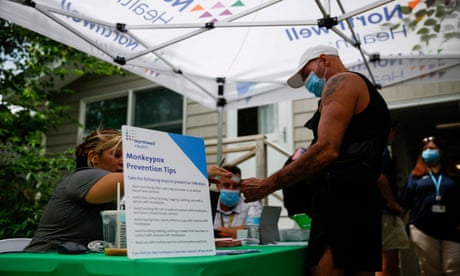- by foxnews
- 08 Apr 2025
Slow response to monkeypox exposes ‘tired, overworked’ US health agencies
Slow response to monkeypox exposes ‘tired, overworked’ US health agencies
- by theguardian
- 02 Aug 2022
- in news

A "slow and bureaucratic" response that has seen monkeypox spread rapidly across the US - with more than a thousand cases in New York City alone - reveals just how badly battered local health agencies have been since the Covid pandemic, advocates have said.
Once a rare African virus, monkeypox has taken hold amid the ragged patchwork of city, county, state and federal agencies that make up the US public health infrastructure.
"Unfortunately, delayed actions mean monkeypox has spread within the gay community and among other men who have sex with men," said David Harvey, executive director of the National Coalition of STD Directors.
"This outbreak has grown to be a public health crisis in America. We are still in a very chaotic situation at the state and local level with an organized response."
As an explanation for the chaos, many observers point to how Covid reshaped the landscape for public health officials. Once considered neutral arbiters of information, many health officials were politically attacked following unpopular mask and vaccination policies.
Across the country, public health officials were harassed, threatened, fired or simply felt burned out and quit. The situation was not helped as resources that had once been devoted to things like tracking communicable diseases, such as tuberculosis, or running routine vaccination clinics, were suddenly diverted to Covid-19.
Sexual health clinics have struggled, too, as testing and staff resources were devoted to Covid-19, hurting organizations that had already suffered years of underfunding.
The result has been worse health outcomes for many basic public health services: routine vaccinations for children have fallen; overdose deaths have exploded; and the US has posted a record-high rate of sexually transmitted infections for the sixth year running.
As monkeypox has spread, the Biden administration has attempted to respond by releasing about 1.1m vaccines and ramping up testing capacity, which has grown from about 6,000 to 80,000 per week. The World Health Organization declared monkeypox a global health emergency this week, and the US could follow suit by declaring monkeypox a national public health emergency, which would release more resources to local agencies.
"The system is tired, it's overworked, it's underpaid, it's understaffed," said Lori Tremmel Freeman, chief executive of the National Association of County and City Health Officials. "All the same issues that plagued us during the pandemic are still with us and haven't gone away.
"What's added to it, with monkeypox and beyond, is that we also have a workforce that has documented mental health trauma after the pandemic."
Public health advocates want the president and Congress to allocate more funds to respond to the outbreak, and for sexual health clinics in general. Public facilities have proven to be the first line of defense with monkeypox, even as federal prevention funding for such work has fallen 41% since 2003.
"Local sexual health providers are being asked to respond to monkeypox on top of an already out-of-control STI epidemic in America," said Harvey. "We are at the breaking point: we need the Biden administration and Congress to immediately fund STI public health programs and clinical services."
Although anyone can catch monkeypox, the virus has primarily affected men who have sex with men. Sexual health clinics have often been frontline responders to the outbreak because of how monkeypox can present its symptoms, with lesions around the genitals and the anus - though sex is just one way monkeypox can spread. Any close contact with an infected person can spread the disease, including touching, kissing and cuddling, as well as sharing glasses, utensils, bedding and towels.
Although the virus, which belongs to the same family as smallpox, is rarely fatal, symptoms can be excruciating, with painful lesions and flu-like symptoms, according to the Centers for Disease Control and Prevention. Up to 10% of people are reportedly requiring hospitalization, , and many are showing up in emergency departments because of severe pain, said Freeman.
The situation is exacerbated because testing for monkeypox is limited. There is no home test and results can take days. There is, however, a vaccine, for which people at heightened risk may be eligible; they may also qualify for treatment with the drug tecovirimat, sold as TPOXX. But the barriers are significant, obtaining it can be tricky, and tecovirimat - usually reserved for people with severe symptoms - must be requested by doctors from the government's national strategic national stockpile, which involves significant paperwork.
Moreover, people without insurance probably lack access to both vaccine and drug, said Freeman; about 12.7% of the LGBTQ+ community lacks health insurance compared with 11.4% of the general population, according to an analysis by federal officials. Even if you do have insurance, there are hurdles baked into the US healthcare system, such as trying to navigate between urgent care clinics, primary care providers and state health departments.
Freeman recounted a story she about a local health department that asked its state for information about a monkeypox outbreak. The state replied to check with the CDC; the CDC then redirected local officials back to the state.
"There's a lot of finger-pointing going on here," she said. "We should have learned. We should know more now than we knew three years ago from our Covid response [about] what we need to do here."
- by foxnews
- descember 09, 2016
Ancient settlement reveals remains of 1,800-year-old dog, baffling experts: 'Preserved quite well'
Archaeologists have recently unearthed the remarkably well-preserved remains of a dog from ancient Rome, shedding light on the widespread practice of ritual sacrifice in antiquity.
read more


